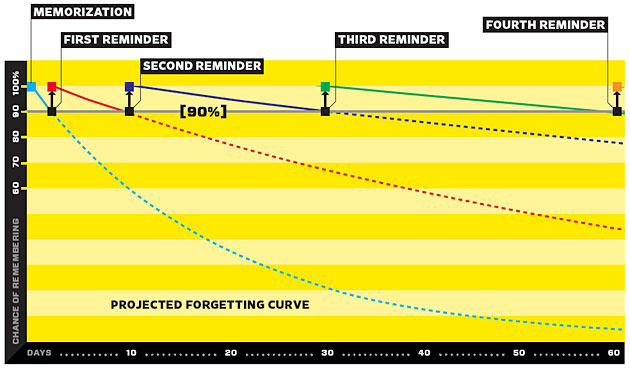QSEU14 Breakout Session: Spaced Repetition
Ernesto Ramirez
June 4, 2014
Today’s post comes to us from Steven Jonas who led the Spaced Repetition breakout session at the 2014 Quantified Self Europe Conference. Spaced repetition is a common topic in the Quantified Self community and we’ve seen great examples from Jeopardy champion Roger Craig and Steven. In this breakout session, conference attendees discussed reasons for using spaced repetition, past experiences, and potential pitfalls. You’re invited to read the description of the session and then join the discussion on the QS Forum.
Spaced Repetition
By Steven Jonas
The Spaced Repetition breakout was a knowledge sharing session around the use of spaced repetition tools, such as SuperMemo, Anki, and Memrise. There were two major themes during the discussion: what can spaced repetition be used for, and what is the value of it?
Many people use Spaced Repetition to memorize vocabulary while learning a foreign language. But it has other uses also. Novel uses of spaced repetition include: remembering the faces of authors of books and articles and memorizing entries from one’s own datebook to construct a mental timeline . We explored other possible uses of this powerful tool, such as remembering facts about people, or using it to keep in mind projects that one would like to do.
Why memorize information when most facts are just a web search away? We discussed a few reasons to commit facts to memory. One is that most breakthroughs come from connecting ideas together. So, by retaining what one has already learned, it makes it easier to make connections with new ideas as they are encountered.
Also, spaced repetition can be used to change your overall relationship with a subject of knowledge. One person told of how he tried to multiple times to learn Spanish with poor results. His conclusion was that he just wasn’t good at learning languages. After using spaced repetition to build his vocabulary, he changed his self-assessment. It wasn’t that he was bad at languages, he just needed a better process. Or consider the experience of memorizing poetry. Holding a poem in memory changes one’s relationship to it. Adding a poem to one’s repertoire creates a sense of ownership over the poem.
We acknowledged in our discussion that spaced repetition practice is fragile, because for it to be most effective it must be done every day. A neglected spaced repetition system leads to an overwhelming number of cards to be reviewed, which can lead to abandoning the practice altogether. This is a problem that, so far, does not seem to have a good solution.
If you’re interested in keeping this conversation going about what should happen to our data after we’re gone you’re invited to join the discussion on the QS Forum.
Tools mentioned:
SuperMemo
Mnemosyne
Anki
Memrise
Duolingo
Additional resources:
Gary Wolf’s article on the creator of SuperMemo
The QS Primer spaced repetition
Gwern’s academic resources
Show&Tell Videos
Roger Craig – Winning Jeopardy
Roger Craig – Spaced Repetition and Anki
Jeremy Howard – Learning Chinese
Steven Jonas – Spaced Repetition and Learning (slides and audio only)



